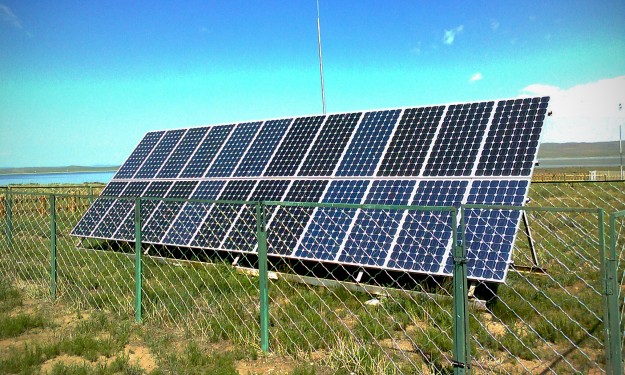Widgetized Section
Go to Admin » Appearance » Widgets » and move Gabfire Widget: Social into that MastheadOverlay zone
Legislative lethargy, fossil fuel front groups slowing solar surge in Colorado, report finds
Editor’s note: A version of this story first ran in The Colorado Statesman:
After years of rapid growth, Colorado’s once red-hot solar energy industry has faded recently, according to a new report from Environment Colorado, which blames fossil fuel-funded think tanks and utilities for raining on the state’s solar parade.
According to “Blocking the Sun: 12 Utilities and Fossil Fuel Interests That Are Undermining American Solar Power,” Colorado’s solar power capacity increased 44 percent a year from 2010 to 2013, but then dropped dramatically between 2013 and 2014, knocking the state from 7th to 10th in terms of solar power capacity per capita in the United States.
“Despite the fact that we have one of the best solar assets in the country, Colorado’s market share is shrinking nationwide due to weak utility support and uneven legislative progress,” Alex Blackmer, president of the 5,000-member Colorado Renewable Energy Society, said on a recent conference call with reporters.
Citing 2013 Gallup polling showing 76 percent of Americans would like to see more of an emphasis on solar energy, including 68 percent of Republicans, Colorado solar advocates expressed frustration at the industry’s backwards slide in the state and pointed to big-money special-interest groups in the report.
“The Koch brothers’ front group Americans for Prosperity [AFP] has been working in the shadows to undermine solar power here in Colorado, and our report shows that they’ve been using the same playbook across the country,” Environment Colorado’s Katie Otterbeck said.
“It’s not the proper role of government to play favorites with politically connected companies,” said AFP-Colorado Director Michael Fields. “We support free market solutions to improve our state’s energy choices without the unfair advantage of government funds being doled out to companies in hand-picked energy sectors.”
Besides the climate benefits of renewable energy, Blackmer pointed to the continued job growth of the solar sector even with the recent decline, noting the solar industry currently employs more people in Colorado than coal mining.
Statistics vary on the number of Colorado solar jobs. The nonprofit Solar Foundation in 2013 cited 266 companies employing 3,600 direct solar workers in Colorado, mostly in manufacturing and installation. However, the Solar Energy Industries Association, claims that in 2014 there were 388 solar companies employing 4,200 people in Colorado.
By comparison, Stuart Sanderson, president of the Colorado Mining Association, told The Statesman there are 21,000 indirect jobs associated with coal mining in Colorado, 6,200 direct jobs and nearly 2,000 people actually working in the state’s coal mines. Coal production in Colorado ranks the state 11th nationally, and coal mine workers make average annual wages and benefits of $122,000.
“To me, it’s not a question of competition amongst jobs,” Sanderson said. “The high-energy-cost community such as wind and solar, they’re trying to displace fossil fuels, and I think every job is important.”
State Rep. Mike Foote, an eastern Boulder County Democrat who represents the cities of Louisville, Lafayette and Longmont, said the vast majority of people in his district and around the state favor developing more renewable energy. But he expects Republicans will once again try to roll back the state’s renewable energy standard that was first approved by voters in 2004.
“This year’s effort was marked by big money that was behind it,” Foote said of a bill that passed in the GOP-controlled Senate but failed in the Democrat-controlled House. “The special interests were flying in people from around the country to claim that we need to have less renewable energy, not more.”
Foote said he expects foes of renewable energy to try again in the next legislative session beginning in January. Last year’s bill would have reduced the amount of renewable energy required from investor-owned utilities from 30 percent by 2020 to 15 percent, and it would have cut renewable sources for rural electric co-ops from 20 percent to 15 percent.
With control of the two houses split between Republicans and Democrats, Foote doesn’t anticipate being able to pass renewable-energy bills this coming session.
“Mostly it was about playing defense against those type of rollback proposals, and I would anticipate the same thing happening again next year,” Foote said.
Sanderson would not say if his trade association would support such rollback efforts, but in general he said the CMA frowns on energy-source mandates.
“Overall, we opposed the mandated markets because Xcel Energy consumers would suffer the consequences, and so we generally oppose mandates for any source of energy, whether it’s renewable energy or natural gas,” Sanderson said. “Those are the sectors that have been the subject of much government largess in recent sessions.”
Gina Hardin, executive director of the climate advocacy group 350 Colorado, said wind and solar pricing is increasingly competitive with fossil fuel forms of electrical generation. She pointed to a group called Fossil Fuel Free Denver that is trying to get the city off all fossil fuels for electrical generation by 2030.
“Because of the stalling on the national and state level, some of the [policy] actions [on renewable energy] will have to be directed at local governments,” Hardin said.
David O. Williams
Latest posts by David O. Williams (see all)
- The O. Zone: OilTrain vs. SunTrain, who you got? Supreme Court set to tip the scales - December 9, 2024
- The O. Zone: Sports, like snowfall and extreme weather, are really hard to predict - December 1, 2024
- The O. Zone: Please bury I-70 burial plan while resurrecting rail - November 26, 2024



